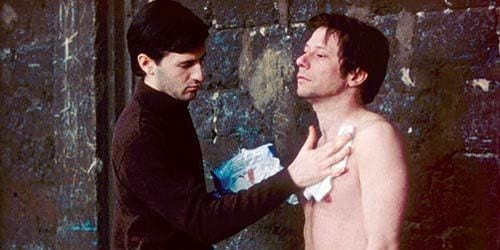
“My seminars were based on the new belief that motivation lay at the heart of productivity. We used a combination of role-play, group dynamics, and old oriental methods, which encouraged people to push themselves to the limit. I’ve seen grown men cry like little boys. I’ve seen people breaking down, going into violent rages. I had to guide them towards my only goal: making them soldiers, knights of the business world, highly competitive subalterns.” — Simon Kessler (Mathieu Almaric), Heartbeat Detector
“He’s been nursing his sorrow for so long. I’ve often seen him cry. I still love the inconsolable child in him.” — Lynn Sanderson (Valérie Dréville), Heartbeat Detector
Based on the novel La Question Humaine by François Emmanuel and directed by Nicolas Klotz, Heartbeat Detector is an emotive attack on the ruthless methods of the neo-liberal business era; a remarkably ambitious project whose foundation is the poisonous legacy left by horrors of the past. It draws explicit comparison between modern corporate practices — which the film persuasively argues are tantamount to dehumanisation — with atrocities committed by the Nazi regime during the Second World War. It is thematically scathing but not vicious in execution; rather than playing out as vitriol it is lyrical, ponderous and strange.
The plot concerns Simon Kessler (Mathieu Almaric), a psychologist working for a German petrochemical giant. The film adopts a somewhat allegorical tone during the first few minutes when Kessler, speaking in voiceover, says, “I worked for seven years in a multi-national company I’ll call SC Farb”. In this way the company from the outset becomes representative for big business at large.
Perversely, for a man whose profession is ostensibly concerned with health and well-being, Kessler is tasked with several morally dubious projects: pushing staff to their limits during motivational exercises; whittling down the workforce to less than half the number of employees as part of a restructuring; and, crucially — as this becomes the focus of the film – he is recruited to spy on SC Farb’s CEO, Mathias Jüst (Michael Lonsdale), whose secretary has observed him behaving in an increasingly erratic and unprofessional manner.
Jüst’s secretary keeps a log of his unusual behaviour, for instance she writes, “September 2nd. Signature changed to initials only. Examples included.” Kessler sets about researching a previous passion of Jüst’s, the SC Farb quartet, which becomes both his cover story and his means to unlocking the secrets of the past. As if he were tracking down the members of a gang, each with their own perspective on a crime, his meetings with the quartet have an illicit quality and intimacy. The confidential information imparted helps him build a picture of the enigmatic Jüst, and leads to the discovery of slanderous missives and ultimately the confrontation of something much larger.
In this way it plays out like a terribly earnest film-noir. In fact the film’s own website describes its protagonist affectionately as a “vulnerable gumshoe”. One of the members of the quartet Jacques Paolini describes the dynamic of the group: “Take four cards: a king, a queen, a jack and a six…You can’t win, you have to throw in your hand. I’m sure you can guess the cards: a CEO, a secretary, a sales rep and a chemist. Music doesn’t tolerate hierarchy.”
Heartbeat Detector exhibits a pervasive melancholy and charged atmosphere, with music acting as its emotional epicenter and providing a pivotal theme; serving to expose both characters’ emotional detachment and essential vulnerability. Speaking of the raves that the company’s young executives regularly attend, Paolini comments, “Violence is a thriving market, a way to let off steam, a kind of necessary ritual.” The pounding beats don’t just mimic but extraordinarily exaggerate the pumping sound of life; becoming an enormous heartbeat reflecting that which has figuratively been suppressed by the demands and cynical methods of the workplace.
Indeed, music has great potency throughout the film. Oscar Wilde once wrote that, “music is the art which is most nigh to tears and memory”. In Heartbeat Detector Jüst carries the unshakable sorrow of the loss of a child. His wife Lucy (Edith Scob) comments that, “Music is an insurmountable ordeal for him. He says he feels pain”.
As Jüst, Michael Lonsdale has a sympathetically hangdog appearance, as if the sadness he carries has a physically oppressive weight. His formidable size and presence makes for an interesting visual contrast to his appraiser Kessler, whose dark, unknowable eyes are at odds with his youthful appealing face and diminutive stature. Both Lonsdale and Amalric (as Kessler) are exceptional throughout.
The film’s clean, cold, industrial palette of blues, greys and sterile whites assists in creating an atmosphere which drains the humanity out of many of its characters. It is an aesthetic which effectively complements the film’s critique.
Intellectual engaging, Heartbeat Detector confronts its audience with uncomfortable connections, philosophical musings and disorientating amalgamations of genre and style. It may frustrate in its dogged refusal to conform; serially confounding audience expectations of what to expect from a corporate thriller but this is brave, distinctive filmmaking, the effect of which lingers long after the final credits roll.
Disappointingly, the theatrical trailer aside, the film is presented without extras.

![Call for Papers: All Things Reconsidered [MUSIC] May-August 2024](https://www.popmatters.com/wp-content/uploads/2024/04/all-things-reconsidered-call-music-may-2024-720x380.jpg)



